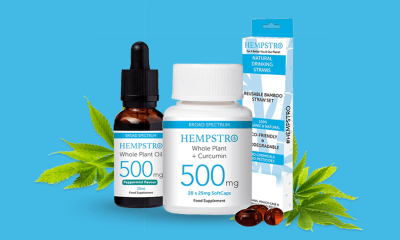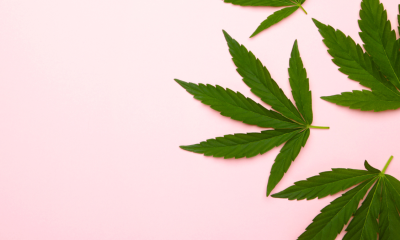BUSINESS
Opinion: Stuck in the middle with EU
To the left we have the FDA, to the right, the European Commission. Is the UK at an advantage or are we stuck in the middle?
LONDON – Across the Atlantic in Washington DC where in mid-July the White House received two cannabis-related submissions from the US Food and Drug Administration (FDA).
One draft proposes guidance for clinical research on cannabis in the guise of a document called: Quality Considerations for Clinical Research Guidance for Industry.
The other outlines proposed steps for enforcement for CBD products on sale in the US market space. FDA officials are understood to have submitted The Cannabidiol Enforcement Policy Draft Guidance for Industry to the White House Office of Management and Budget. This department must approve the proposal before it can go any further.
It’s not yet known what the contents of this proposal set out, however it is hoped this move could mean clarity may finally be on the horizon for the US CBD space where things like labelling and a recommended daily intake are concerned.
Within the same week, the European Commission announced it was considering the view that CBD may be more in line with narcotics than previously thought in a surprising move. A novel viewpoint to say the least, when one ponders the evidence and safety profile of the trending cannabinoid.
The Commission has paused novel food applications for now, the main talking point across the British and European industries for the past 18 months.
To sum it up for anyone unfamiliar with this process, the Novel Food Regulations are a set of guidelines which depict what is and isn’t approved for the European food chain. The regulation of CBD as a novel food would see all consumable CBD products such as tinctures, gummies, capsules and more placed under food safety rules.
This new perspective, it’s thought, comes from a consideration of enforcing a labelling requirement which jumps from the CBD-is-a-food category to the ingredient being instead related to narcotics or psychotropics, in what could be a major step back for the CBD sector.
Here’s where it gets more complicated. The money.
So far, approximately 50 CBD companies have filed novel food applications and paid a sizeable fee to do so. Some have told me that they have paid six figures per application, all in a bid to comply with the previous EU recommendation. The CANNAVIST has contacted the European Food Safety Authority to ask if such funds may be refunded in the future if CBD is in fact removed from the novel foods database.
EU food regulations, like many of the other EU pathways, vary in levels of enforcement and interpretation among member states, which can lead to a patchwork pattern forming across the continent.
Naturally, the European Industrial Hemp Association (EIHA) has a lot to say on this matter. When the news was announced, the board of farmers, producers and processors released a statement titled: “The European Commission about to kill the hemp sector”.
The EIHA went on to say:
“The executive body of the European Union froze all applications of hemp extracts and natural cannabinoids under Novel Food regulation, considering them to be drugs. If confirmed, this position is likely to strike the final blow to the sector and deprive farmers from a low maintenance and profitable rotation crop with the potential to bringing environmental benefits. Cannabidiol would stay on the market but only in its synthetic form, produced via polluting chemical manufacturing.”
What will happen on the bloc?
If CBD is stripped of its novel food status and officially labelled a narcotic, the European sector will be at risk. Large companies, particularly drug manufacturers, will be the sole beneficiaries where any natural extract is concerned. Small companies, start-ups and self-run operations will be under threat and many will be forced to close. Synthetic CBD will survive, but is that really what brands want to market? A synthetic version of a natural plant extract? The marketing alone would surely suffer.
The EU stance on narcotics, or controlled substances, adheres to the UN Convention system on narcotics and psychotropics. Both lists typically schedule drugs on three keys: a basis of risk, likelihood for abuse and likelihood of addiction. Therein lies the crucial word, ‘drugs’.
In a time where cannabis itself is becoming more tolerable, less stigmatised and having carved out a decriminalised corner of the health and wellness sector, it’s so far precious and uncontrolled extract faces yet another roadblock on the road to success.
Where does this leave CBD in the UK?
Casting all politics aside, Brexit may be the saviour to the already burgeoning British CBD sector. As we come to the end of the transition period and the UK gears up to formally leave the EU, the Food Standards Agency will welcome compliant products to the market from April 1 next year.
The FSA has said CBD will not be classified as a narcotic in the UK meaning the industry here shouldn’t feel a negative impact from whatever the EU decides. The FSA will process novel food applications from January. In a response to a press request from The CANNAVIST the food authority said:
“The FSA will be formally accepting novel food applications from January 2021, after the Transition Period ends. The EC remains the route for formal submissions until that time.
“Narcotics are overseen by national legislation and the FSA’s view is consistent with the Home Office in that CBD extracts themselves are not considered narcotics. If a product is classified as a narcotic it would not be subject to novel food regulations.”
Novel food authorisation applications need to demonstrate that their CBD product is not subject to control under the Misuse of Drugs Act 1971 according to the FSA. If a CBD product is found to contain THC (or another controlled cannabinoid), then it is highly likely that the product would be controlled at which the Home Office may be involved.
Further guidance is available in the Home Office factsheet “Cannabis, CBD and other cannabinoids”.










